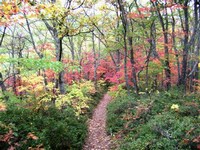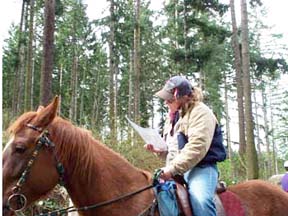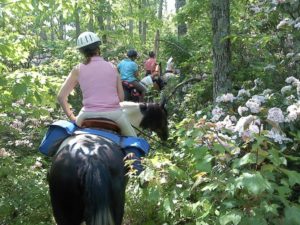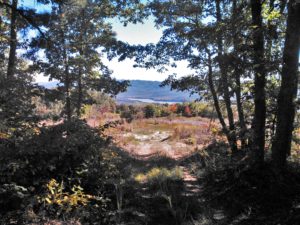What is Orienteering, and Why Should I Learn it?
Orienteering is the ability to find your way around unfamiliar territory using a map and a compass. Orienteering is a useful skill whether you are in a city or a forest, and is a major component of several sports, such the equestrian sport of TREC, competitive orienteering and geocaching.
But, many other people find some orienteering knowledge helpful. Hikers, mountain bikers, and equestrian trail riders are the largest group of people who benefit from knowing how to orienteer. There are thousands of miles of trails available to these groups but many people do not venture out as they would like for fear of getting lost. Even though public forests will often have trails marked, it can still be confusing and intimidating, and it’s not uncommon for signs and markers to fall or be removed by unauthorized people. Sure, you can take along a phone with a tracking/map app or GPS unit that will track you, and many phone apps have the ability to download maps ahead of time and save them to the phone so the app can show you in real time exactly where you are on the map even when there is no cell service. And those are wonderful and I use them a lot. But what if your phone dies? There are a number of reasons your phone may not be reliable. It’s not uncommon for the compasses in phones to be inaccurate, the battery may die, the phone may get wet (if it’s not waterproof), you may drop it while trying to look at the map and break it, it may even become unstable simply from the movement of the horse, depending on where you keep it stashed. If you want to camp for several days, charging the phone may become an issue. The point is, phones are delicate electronic devices and it sometimes does not take much to upset them. It’s really not a good idea to totally depend on such a device. GPS units are often more rugged, but they also often have less features available, a smaller more difficult screen to view, and have a bigger learning curve. And what about those people who just have a hard time with electronics in general, especially the touchscreen variety? My husband is one of those people, and I know several others.
less features available, a smaller more difficult screen to view, and have a bigger learning curve. And what about those people who just have a hard time with electronics in general, especially the touchscreen variety? My husband is one of those people, and I know several others.
So, for many people, while we will go out for long rides or hikes with people who know the trails, we are not so willing to go far in unfamiliar territory when there is no guide.
Orienteering with a map and compass is far more reliable and less finicky than electronic devices and neither one will run out of battery power. Once you understand how to read a topographical map and understand how an orienteering compass works and know how those two items work together, you  will be able to plan a trail route in any area that has a trail system and be assured of getting back to the trail head in an acceptable time and manner.
will be able to plan a trail route in any area that has a trail system and be assured of getting back to the trail head in an acceptable time and manner.
My horseback orienteering classes will teach you the map and compass skills. You will learn how map topographical features correspond to the terrain, how to orient your map to the real world, how to take a bearing on a point on a map that you cannot see in the real world and navigate to it, and how to take a bearing on a place you can see in the real world and follow that bearing once you can no longer see your objective. Once you are comfortable using the map and compass, we will go out on horseback to the National Forest and apply what you have learned to the landscape around you. We will also work on judging times and distances and your horse’s pace so that you can estimate how long a trail will take and be able to plan a route that will get you back before dark. You will learn about which types of maps to use, which types of compasses are best, and other tips on gear and safety. You will eventually have the opportunity to plan a ride in an area that has many trails and use your knowledge to get around the route and back to the trail head, with me along as a “safety net.”

